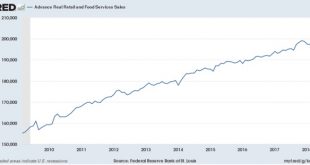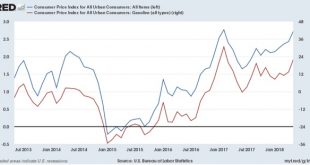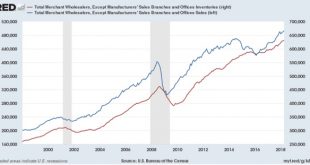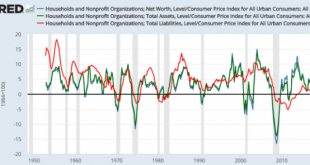May retail sales come in strong Real retail sales for May came in strong, up +0.6% just in the month: As the graph shows, this is on trend for the entirety of this expansion, and is also a new high, surpassing that of last winter. Per capita real retail sales also made a new high, an indicator that the expansion is likely to continue at least one more year: Finally, the YoY% growth in real retail sales has also been increasing:...
Read More »Is Strengthening Labor Good for Development?
Is Strengthening Labor Good for Development? Servaas Storm, who’s always worth reading, has posted on the INET website a summary of a new working paper he coauthored. This issue goes way back with me—I first started looking into and writing about the labor rights/wage/trade/development nexus back in the 1980s. Working on my own, I had a lot of false starts, and I’m happy to see others digging much more deeply today. I won’t comment on the substance of...
Read More »Gas- and housing-powered inflation mean real wages are going nowhere
Gas- and housing-powered inflation mean real wages are going nowhere This morning consumer price inflation for May was reported at +0.2%. YoY inflation was 2.8%. This is tied for the highest in six years (blue): The cause of the increase was primarily twofold — and neither one reflective of wage inflation. First, gas prices have increased by over 20% in the past year (red, right scale above). Second, the costs for shelter (housing) are picking up...
Read More »Update: wholesalers’ sales and inventories — it’s all good
Update: wholesalers’ sales and inventories — it’s all good Another slow start to the data this week, so let’s take a look at relationship I haven’t updated in awhile. Total sales in the economy are broken up into three categories: manufacturers’, wholesalers’, and retailers’. We’ll get retail sales, the biggest component of the three, later this week. But wholesalers’ sales and inventories were released last week, and are a useful coincident...
Read More »Backstabbing Over Cows
Backstabbing Over Cow What is it with cows? I mean their flatulence does add to global warming, but they seem so benign, chewing their cud while producing milk and meat. Why is it that national leaders get into fits of backstabbing over them, or especially over all that milk they produce? Well, of course, that is it; they produce a lot of it, and a variety of products come from the milk, which sometimes markets do not want as much of as some of the...
Read More »Robert J. Samuelson Also Exaggerates Social Security Problems
Robert J. Samuelson Also Exaggerates Social Security Problems Not really a surprise, after all, it is Monday, and RJS has been at this for quite a long time at his post at WaPo. But the recent release of the Trustees’ Report has not only gotten the Associated Press all bent out and shrieking “insolvency,” but I think with the push coming from the recent massive tax cuts that are swelling the budget deficit, the usual old gang of “cut the entitlements!”...
Read More »What Causes Recessions? A Physicists’ Complex Systems Model
by Steve Roth What Causes Recessions? A Physicists’ Complex Systems Model I received some very interesting comments from Yaneer Bar-Yam to my recent Evonomics post— “Capital’s Share of Income is Far Higher than You Think.” He pointed me to his very interesting paper, “Preliminary steps toward a universal economic dynamics for monetary and fiscal policy.” I’m using this space to reply with with some stuff that can’t display in that comments space. I...
Read More »The Wage[s]-Lump Doctrine — still dogma after all these years
The Wage[s]-Lump Doctrine — still dogma after all these years “The wage-fund doctrine was the quintessential product of what Marx termed vulgar political economy; a dogma concealing real economic relations, on the one hand, and justifying them, on the other. It was a transparent effort to disarm the working-class movement, and an attempt (largely successful) to rally public opinion behind bourgeois resistance to the demands of working people for a...
Read More »Sanction Trump not Bourbon
This post “America’s allies should respond to steel tariffs with targeted sanctions on the Trump Organization” by Matthew Yglesias is brilliant (even though he is mainly agreeing with the prior brilliant article by Scott Gilmore “Trade sanctions against America won’t work. Sanctioning Trump himself might.” The proposal is so brilliant and the case for it so clear, that, I think, each title is enough to convey the idea. Yglesias elaborates while quoting...
Read More »AP Exaggerates Social Security Problems
AP Exaggerates Social Security Problems Dean Baker at Beat-the-Press has pointed out (sorry, not able to link to it) that Associated Press put out a tweet that presents an essentially hysterical story about future prospects for Social Security following the recent release of the Trustees. This report says that as of 2026 Medicare and as of 2034 Social Security will face a “shortfall.” However, the AP tweeted that what they face is “insolvency.” ...
Read More » Heterodox
Heterodox




